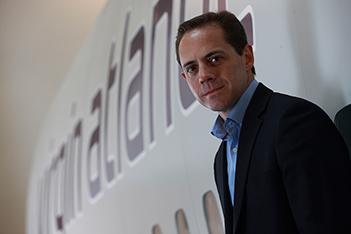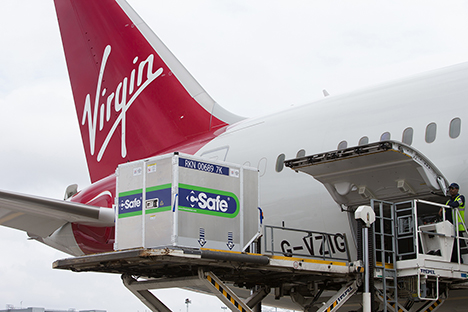INTERVIEW - John Lloyd: A good year so far for VA, with Cool Chain and e-commerce both delivering strong growth
- News Feed
- Wednesday, 23 August 2017
 JOHN Lloyd, Managing Director of Cargo at Virgin Atlantic Airways, has stepped down after a 30-year career with the carrier.
JOHN Lloyd, Managing Director of Cargo at Virgin Atlantic Airways, has stepped down after a 30-year career with the carrier.
He joined Virgin Atlantic Cargo as cargo operations officer based at Gatwick in 1987 after working with Gatwick Handling in its cargo office.
He progressed within Virgin from supervisory and management positions based at Heathrow and Gatwick to become director of Cargo of Virgin Atlantic Airways, managing Virgin Atlanticís entire cargo operation globally.
Lloyd was popular with his colleagues and instilled a passion for customer service that ensured the carrier was consistently rated as one of the best cargo-carrying airlines in the world, winning 14 'Cargo Airline of the Year' awards since 2002.
AirCargo Asia-Pacific talked to Lloyd on the eve of his departure about his career and his next move.
So, what kind of year is Virgin Atlantic Cargo having?
Our performance in the first six months of the year has been very encouraging. Volumes to the US have been exceptional, although the eastbound market from the US remains extremely challenging. The impact of this, however, is being balanced by the growth we are experiencing across many of our other international routes to and from the UK. Our half-year figures showed revenues up three per cent year-on-year to GBP93.4 million while cargo volumes for the six months ending 30 June were up six per cent over the same period a year ago to 112.5m kgs. Overall, cargo carried on Virgin Atlantic's services from the UK increased 12.2 per cent in this period.
Outside US business, what has pleased you most this year?
We've seen a lot of positives. Our Cool Chain product recorded a 20 per cent rise in the volume of pharmaceutical shipments in the first half of 2017 and our perishables and e-commerce traffic has also risen year-on-year. Combined volumes to Delhi, Dubai, Hong Kong, Johannesburg, Lagos and Shanghai were 5.6 per cent higher for the half-year, driven by particularly strong demand to Nigeria and China. Our inbound business from India, Africa and China has also increased and volumes generated from Australia for Virgin Australia's long-haul international network are 11.8 per cent up year-on-year. Our Caribbean business is also performing well with 44 per cent more tonnage in the first six months of this year versus last year.
You have had a very successful track record with Virgin Atlantic Cargo. Why leave?
You're not the first person to ask that question! This year marks my 30th anniversary with Virgin Atlantic, including the last 16 years as head of our cargo division. I just feel it is the right time for me to find a new challenge. It's quite funny because since I announced my decision in April, I've had a few emails from industry friends and customers congratulating me on my upcoming retirement! I am most definitely not retiring! It's just time for me to do something new. It's very unusual these days for an airline to have had the same head of cargo for so many years and I am extremely proud of what we've achieved as a team over this period.
Where to next?
I didn't make my decision because I had a particular plan in mind or a new job to go to. I am just fortunate that I am at a time in my career where I can take a risk and see what happens.
I'll know when the right opportunity comes along.
 Did you complete your planned objectives?
Did you complete your planned objectives?
When we started out, we wanted to do something different and have a different approach to how we worked with our customers. We've always been passionate about customer service and I believe that overall we have earned a reputation for that. Obviously there are times when service levels are affected for one reason or another but we've always tried to be honest with our customers and ensured we've fixed any problems as quickly as possible. Another thing that has always been personally very important to me and my team is to ensure we are accessible to our customers when they need us. That's really important to us.
The air cargo market is tough and extremely competitive. People often forget that we are not a big airline in terms of our fleet or our own network. We've had to work very hard year after year to punch above our weight. I am proud that the Virgin brand and the Virgin cargo team have earned such a good reputation. As I said, we talk about our commitment to great service, but customers judge you on what you actually deliver. We've won 14 cargo airline of the year industry awards since 2002 so hopefully that suggests our customers feel we deliver what we promise.
What have been the biggest benefits coming from the Delta joint venture?
From my personal perspective, I've really enjoyed working with Gareth Joyce and his team at Delta. I think both airlines have learned a lot from each other and continue to do so. We've successfully co-located our cargo handling operations in the UK and across many of our US stations and in terms of what we can offer customers across our transatlantic network we're now able to give them more choice. There is clearly a place for both brands in the market but I am sure there will be more benefits for the customers of both airlines going forward as a result of the JV.
Boeing is scaling back its 747 and 777 runs, Airbus is making changes to the A380. What jet choices do you tip for the airfreight industry in five years?
Virgin is continuing its fleet-modernisation program to improve our customers' experience and take advantage of the improved economics of the latest generation of aircraft. We already operate the Boeing 787-9 aircraft and in early 2019, the airline will start to take deliveries of the first of its 12 new Airbus A350-1000s. These are designed to be 30 per cent more fuel and carbon efficient. In cargo, we've been part of the fleet discussion because we make a very important contribution to route profitability. The A350-1000 is certainly going to be a great aircraft for cargo and will offer between a 10 per cent and 22 per cent improvement in lower deck cargo capacity over the aircraft it will replace, depending on configuration.
What were some of the highlights of your career with Virgin Atlantic?
There have been a lot of highlights. I am proud of the interactions and relationships I've had with our customers, which have been very meaningful to me. I think customers really like what we do, they like our people, and they want to support us when and where they can. Obviously you need to be competitive and you need to offer the routes they want but beyond that, I believe service and relationships still mean a lot in the cargo business. I hope we've also brought some fun into our customers' lives because we've wanted to do that too.
It has also been gratifying to know that cargo has made, and continues to make, a very big and important contribution to the success of Virgin Atlantic and that we are a vital part of the business.
It has also been a great pleasure to work with Merren McArthur, chief executive of Virgin Australia Cargo, and her team. I am so pleased that we continue to be part of their growth through the international long-haul cargo sales and management agreement we've had with Virgin Australia since 2009. It has ensured we've been able to retain our own presence in Australia, where we have a fantastic team led by Pip Palmer. Trips to Australia have been a particular highlight of my time with the airline. I love the country!
Also, the awards we've won have been special to us because they represent great recognition for our entire cargo team and our partners around the world. There's nothing better than when your customers say you're doing a good job.
Would you have done anything different given the benefit of hindsight?
To be honest, I don't think so in terms of the decisions we've had control of.
Who helped you most in your career?
I will always be grateful to Jane Spanton who, as operations manager for Virgin Atlantic, gave me my first job with the airline and, most importantly, instilled the passion for service that still runs through the business today. Jane was extremely professional but also a tough operator. She simply didn't accept mediocrity when it came to customer service. Many a time in the office, if a phone rang more than three times, Jane would hurl something across the room at the nearest person to spark them into action!
I also have to say Alan Chambers, who was MD of cargo when I joined Virgin. We had a lot of good times but also some very difficult challenges, not least after 9/11 when like a lot of companies in the industry we had to reduce the size of our team by 20 per cent to cut costs. The hardest part of the job is seeing good people leave.
What does the Brexit vote mean for Virgin Atlantic?
It has been a tough operating period post referendum. The fall in the pound increases our biggest operating costs such as fuel and aircraft leasing, which are borne in dollars. It also affects the price of travel for UK customers. We are confident in the steps we have taken to minimise the risks to our business of a weaker pound following an event like this. We need to look to the longer term, and remember Britain's economic strength, our business relationships across the globe and our proud trading heritage. We're ready to succeed in the months and years ahead.
Would you recommend airfreight as a good career move?
Absolutely! If I look at the people in our own cargo business, we have some of the best and most talented people in the air cargo industry. The best feeling is giving them opportunities to progress their careers within the airline. For the industry as a whole, however, I feel we suffer from having no formal career-based qualifications that are recognised. That needs to change. We are part of global supply chains that benefit companies, consumers, communities and economies across the globe. We should all be proud of what the air cargo industry does and be actively promoting it as a great career choice to young people.
How do you see the new Air France-KLM, Delta Air Lines and Virgin Atlantic transatlantic partnership affecting cargo growth?
We're really excited by this news as it will provide greater opportunities for our customers and ensure Virgin Atlantic is strongly positioned for long term success.










